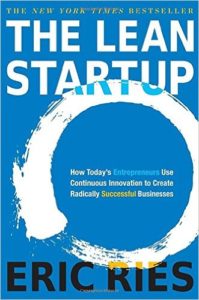What’s the most important thing to do when starting a company?
How about this: Don’t try to build the company. Instead, try an experiment.
A confluence of events and conversations have me re-asking that question, and landing on that answer.
The first event is that my city celebrated “Startup Week” in the beginning of March. I attended gather ideas on the central mystery of startups. The mystery is – how do you manage that initial transfiguration from a mere idea stuck inside a lunatic entrepreneur’s head to a real-live business providing a service, satisfying customers, collecting revenue, and employing people?
The second event is that a few weeks ago I started asking people in my own network for advice about a financial technology startup idea of mine. It’s a genius idea, obviously. Just ask me. A few minor stumbling blocks exist for me, however, like for example I’m not a technology guy and I don’t have direct experience in the relevant financial industry. That is not going to stop me. With a small dash of humility, however, I reached out to friends for advice.
One of my best friends works in the Bay Area as a software development manager. “You should read The Lean Startup,” by Eric Ries, he mentioned casually in the course of our phone call.
Next I called my cousin in Boston, currently in year five of his tech startup, for advice. “BTW, have you read The Lean Startup?” he texted after our call ended.
The next day I asked advice from a friend in my neighborhood who had successfully launched a technology company while still in college. As he laid out some suggestions, he added, “of course, you know the ideas from The Lean Startup?”
Ok, ok, guys, fine! I’ll read it. One does not simply start a company anymore. Apparently, one does a lean startup first.
The point, as I’ve now learned by reading Ries’ book, is not to build a finished product or company and then deliver that to a customer. The point is to design a series of business experiments to learn what customers want most.
Do customers respond to certain type of marketing pitch? Do they even use a proposed product in the way you expect? Or maybe they have a different preference for features than you expected?
Ries argues that cheap testing – followed by fast innovation in response to customer data – will succeed more often than a fully-built solution.
Ries makes the interesting point that big companies too can employ lean startup techniques. Instead of investing huge dollars and months or years in research and development, he argues, small teams within a larger organization should be encouraged to attempt small-scale experiments, all the more easily trashed, or expanded, as they gain feedback from customers.
So that’s what Ries means by “Lean Startup.” Seemingly every entrepreneur in my acquaintance has bought into this idea.
Ries goes on to redefine, for entrepreneurs, what their “burn rate” is.
In a typical startup, we might think the burn rate is determined by comparing the money in the bank and the speed at which the startup incurs costs. With $700,000 in the bank, and $100,000 costs per month, we can say that the company has roughly seven months before it runs out of money. A seven-month opportunity to achieve sustainability is an important measure of survivability
Ries seeks to re-define a different kind of survivability-pace for startups. Specifically, how much time and money does it take to test a business hypothesis? If a startup can legitimately prove or disprove a business idea in four months, that’s fine. If, however, the next startup experiment only takes two months to disprove or prove an important idea, then the startup is in effect improving its chances of survival. The shorter the time the company takes to test innovations, the better its chances of survival. The more ideas it can test, before it runs out of money, the greater the chance of sustainability. Ries says this is a better measurement of survivability.
SA Startup Week
At Startup Week, I arrived ready to test whether that’s indeed what successful entrepreneurs do in my city.
By happenstance, I picked a particularly “lean startup-ey” event venue, organized by entrepreneur George Haskell, founder of cheap-airfare service Whiskr.
Haskell had organized this meet-and-greet for startups and interested people in what he described as “science fair for startups.” At the event, entrepreneurs set up a quick and easy booth to show off and describe their wares or services. It was an experimental venue with a knowing nod to high school-level experimentation.
 Did Haskell endorse the lean startup model for his own business?
Did Haskell endorse the lean startup model for his own business?
Oh yes. Haskell described to me an extremely cheap form of experimentation, on his way to business creation.
“My company started in 2012 as a simple mailing list. We pitched it at travel conventions, with just a t-shirt and stickers, simply talking to people. I got their feedback, what they wanted, what they didn’t want.”
With a mailing list of interested customers, Haskell would personally spend hours online searching for what he called “mistake listings,” of cheap fares – like flights cross-country for less than $175, or to Europe for less than $300, or to Asia under $400. Having first built his customer base experimentally, and a manual process for finding what they wanted, he launched this past week an automated process of delivering deals fast to his customers. It all sounded quite lean startup-ey to me.
 After chatting with Haskell, I wandered over to a different booth at the science fair for startups. Probably because I’m a coffee addict, I grabbed the Vanilla Bean Espresso granola sampler on my way past the Wildway Granola table.
After chatting with Haskell, I wandered over to a different booth at the science fair for startups. Probably because I’m a coffee addict, I grabbed the Vanilla Bean Espresso granola sampler on my way past the Wildway Granola table.
As it turns out, Kelli Koehler and her husband Kyle began Wildway with a series of experiments as well.
“We started at farmer’s markets. We tested a lot of different flavors,” says Koehler.
In the beginning they would make just 20 to 40 bags of granola for one farmer’s market.
“We would get feedback right then and there from consumers, over and over again, from hundreds of people in one four-hour farmer’s market. We tested a lot of flavors that we don’t have today because they didn’t hit a wide enough audience or they fell flat.”
I asked about their packaging.
“We started with ‘the sad brown bag’ as we like to call it. Just a brown bag with a sticker, and the sticker evolved every single week. We would add stuff to it, take it off, change the shape. We were still trying to figure out our voice, our branding, what we stood for, what we wanted that to feel like. We went through lots of iterations.”
“Our motto has always been to get it out there to market, and to see what happens. You can always improve and make changes along the way, but nothing is going to happen if you don’t at least put it out there.”

Koehler proudly reported to me that Wildway Granola is sold in over 700 stores nationwide, including Whole Foods and HEB. Koehler totally endorses the lean startup approach.
“This is a quote that I have on my whiteboard above my desk, and it’s from Mark Twain, and he says ‘Continuous improvement is better than delayed perfection.’
So I learned that Mark Twain, nineteenth century wit, was also a lean startup guy.
Entrepreneurs: Don’t build the whole company. Build an experiment and improve from there.
A version of this post ran in the San Antonio Express News and Houston Chronicle.
Please see related posts on entrepreneurship:
Entrepreneurs – The difficulty of funding
Entrepreneurs – The difficulty of getting started
Entrepreneurs – Bring half the luggage, twice the money
Entrepreneurship – The air, the taxes, the retirement
Please see other book reviews – especially All Bankers Anonymous Book Reviews In One Place!
Post read (787) times.






